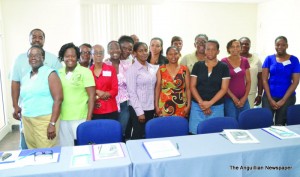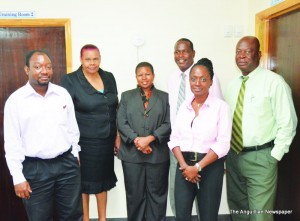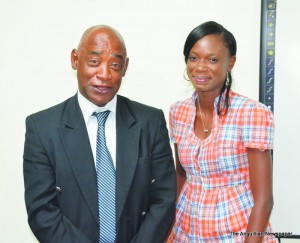


The second training workshop on Foot Care Management, focused particularly on the fight against the complications of diabetes, was held this week at the Anguilla Community College with funding from the Social Security Board and the Health Authority of Anguilla.
Diabetes is one of a number of chronic non-communicable diseases which are being seriously addressed in Anguilla, hence this week’s foot care workshop. The participants are drawn from the Princess Alexandra Hospital, the Senior Citizens’ Homes and the community.
“This session is being conducted as a requirement of the Chronic Non-communicable Diseases Programme in Anguilla,” Nurse Alicia Haywood said at Monday’s opening ceremony. “The facilitators are Mr. Owen Bernard and his Assistant Ms Monick Campbell. They will be working with eighteen participants, starting with the first two days of theoretical work, and the remaining three days of practical sessions in the clinic. Nine of the participants will be re-certified in foot care, while the other nine are being trained for the first time.”
Mr. Bernard and Ms Campbell, to whom Nurse Haywood referred, are from the Jamaica Chapter of the World Walk Foundation. They are part of a consulting team traveling through the region promoting awareness of foot care.
Health Planner, Lynrod Brooks, who spoke on behalf of the Ministry of Social Development, said that good foot care, for diabetic patients, was very important and that a daily routine of treatment was necessary to keep persons healthy. “Although treatment for diabetic patients has improved, effective prevention methods, including good control of blood sugar levels, are still the way to manage diabetic complications,” he stated. “I take this opportunity to thank the Health Authority of Anguilla and the Anguilla Social Security Board for partnering to host this training workshop on Foot Care Management. Your efforts to make a difference in the lives of diabetic patients, who require continuous treatment, must be applauded.”
Acting CEO of the Health Authority, Ralph Hodge, said that despite limited financial resources his organisation was committed to taking health a step forward in Anguilla. “I can assure you that health is one thing that will not go away from us, and we will have to do whatever is possible to make sure we better our health,” he stressed. “When you have better health, you are bettering your community in general. If you do not have good health, do not talk about education, development or anything else in a community. This is because your health is what dictates your development in any community.”
Dr.Sherlan Richardson said there were a number of chronic non-communicable diseases, but diabetes was the most serious one throughout the region and the world. “Limb amputation is a common end result of uncontrolled diabetes and in-effective foot care. In other words, if you can control your diabetes, if you have proper foot care, many of these things can be prevented, if not all,” he stated.
Dr. Richardson did not have actual statistics, but he said that for this year alone there were 4 – 5 amputations as a result of diabetes – that’s one every month. “Maybe the number doesn’t seem very large, but when you consider that this is something which potentially could be prevented, it is more significant than we think,” he told his listeners.
He recalled that in June 2011 foot care in Anguilla was highlighted as an area of great importance and thatit was one of the key matters discussed with PAHOtowards the start of a foot care clinic. In October that year, Mr. Bernard trained fifteen persons as first level foot care assistants.
Dr. Richardson said foot care assistants were being trained to assess the feet of patients, recognise different conditions and treat or refer patients, if necessary, for further treatment. He added that patients were not only being treated, but also educated on how to better care for their feet to avoid repeatedly seeking help for the same problem or a worse condition.
“What we are trying to do is to prevent loss of limb – which may be digits – not necessarily the whole limb, but partial amputations of the foot below or above knee amputations,” he explained. “We can avoid this by proper foot care and early recognition…With proper foot care, most amputations could likely be prevented. I never speak absolutely, because it is probably not absolutely true, but in most cases we will be able to prevent some of these amputations.”
Mr. Bernard quoted the International Diabetes Federation as stating that every thirty seconds a lower limb was lost as a result of diabetes complications. He noted that in Jamaica of all the persons who had lost limbs over the past twenty years, more than seventy percent of the amputations could have been prevented by education. He added that the treatment of diabetes called for a multi-disciplinary approach and that foot care was no longer regarded as a minor matter.
The week-long workshop sessions were organised to cover such subject areas as an anatomy of the foot; integrated foot examination; foot deformities; diabetes and how it affects the foot; foot problems in general; foot exercise and massage; fungus of the foot; and a number of practical exercises.







